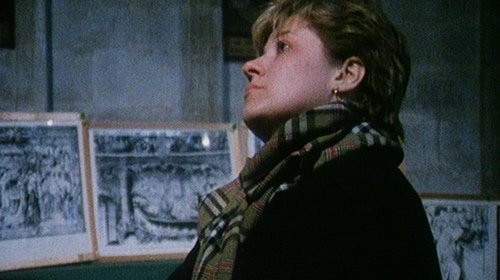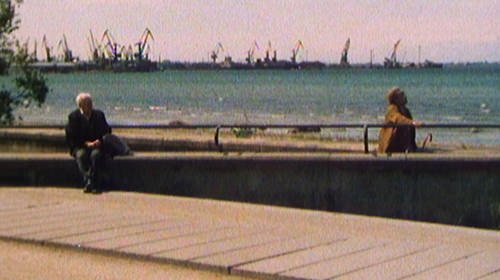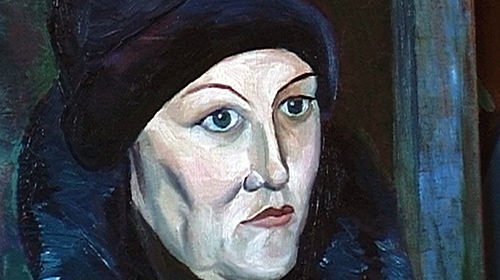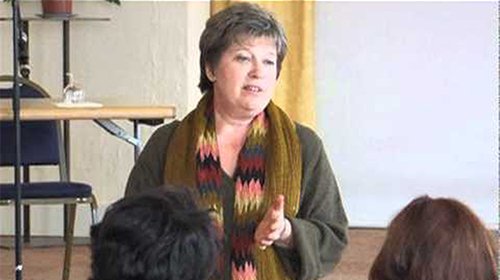Kersti Uibo
Documentary Film-maker
Biography

Kersti Uibo calls herself one of life's hitch-hikers. She attributes both her intuition and her risk-taking to the way in which she focuses on the present moment. This hitch-hiker's journey began for Kersti on the Baltic coast where she grew up. The Ice Age had left behind an erratic boulder on her local beach, a geological stranger, whose silent presence seemed to invite her to make her own journey. Over time Kersti's journeys grew longer; first to Pärnu to study music, then to Tallinn, the capital city of Estonia, to study English, and finally to Moscow to study languages. During a short trip to the Black Sea, she met her life-partner and moved from her native Estonia to cosmopolitan London. The hitch-hiker was at last on the open road. Graduating from the National Film and Television School in Beaconsfield, Kersti started travelling again, this time with a camera. After years of making documentaries, Kersti has now returned to the place where she started from - to her home beach in Estonia, and to the "Wombstone" that had so intrigued and inspired her as a little girl.
Awards & Festivals
Diva in the Bath
Silver Hugo Award, 1994 Chicago International Film Festival
Young Filmmaker of the Year Competition finalist, Edinburgh International Film Festival
12 international documentary film festivals
Evald's Acre
Grand Prix 1995 Pärnu International Documentary Film Festival
Museum of Modern Art, New York, New Directors, 1995
Baltic Retrospective in Paris (Cinema du Réel)
Baltic Art Festival in London
Montreal Documentary Film Festival
Baltic Cinema Retrospective
Narrow is the Gate
Alexander Sidelnikov award for Best Direction at the Golden Knight festival in Russia, 2003
Estonian Peoples’ Award 2002, Pärnu International Documentary Film Festival
The Excellence and Creativity Award in USA, “2003 the Best Documentary”
The FAJR International Film festival in Teheran
Mumbai International Documentary Film Festival
Belgrade Documentary Film Festival
Munich International Documentary Film Festival
Still Life with Wife
2006, nominated for the Estonian Documentary of the Year
Temps d'images art films, Lisbon, special mention
Message to Man, St Petersburg
This is the Day
Cottbus Film Festival, 2012
Persistence Resistence, Delhi ,2012
Vilnius International Documentary Film Festival, 2012
Center for Documentary Art, New York, 2014
Wombstone
Pune Short Film Festival, India, 2020
Veracruz Short Film Festival, Mexico, 2020
Short to the Point, Romania, 2020
Rolling Ideas, Romania, 2020
Fotofilm Short Film Festival, Istanbul, 2020
Goa Short Film Festival, India, 2020
PÖFF Shorts ( Black Nights Film Festival), Tallinn, 2020
Alibag Short Film Festival, India, 2020
Kish Mowj International Film Festival, Iran, 2020

Heartsong
It is 1990. The USSR is in the process of collapse. Estonians who fled their homes as refugees during the Soviet invasion of 1945 are about to return for the first time. Albert Kerson, a Cornwall man, who was an Estonian farmer, is among them. Now he is going back to his home farm after almost half a century.
Heartsong tells the story of Albert´s country through the songs of his countrypeople at the national Song Festival. These songs of love for the soil and the forests of their native land unite and give strength to young and old alike
Diva in the Bath
1993, NFTS, UK, 31 min in Estonian (no subtitles)
Director, camera, sound (together with Janine Prins), editor, producer Kersti Uibo
Diva in the Bath features two sisters from Estonia. Pille is a young soprano travelling to Brussels for an operatic competition. Kersti is a filmmaker who has decided to shoot the story as her first assignment. Each sister is as nervous as the other and what the film lacks in polish, it makes up for in raw-edged authenticity. As emotions well up and overflow, incidental details enrich the narrative. On the day of the competition, Pille calms herself by mending her bra and cleaning the shoes she bought from a flea market. (Evening Standard)
Evaldimaa
1994, NFTS, UK, 45 min, Estonian (no subtitles)
Director Kersti Uibo, camera Pentti Keskimäki, sound Kersti Uibo, editor Soren Ebbe, producer Kersti Uibo
Evaldimaa is a loving portrait of the Estonian pastor and teacher Evald Saag and his wife Emmi. Occupying armies have come from East and West, but Evald’s acre remains a clearing of peace in the Estonian forest. Yet this peace is not the inactivity of old age; there is always work to be done; the hard tasks of daily survival and the teacher’s vocation of giving wisdom to the young. Evald and Emmi have never been silenced and will never retire. Their life’s sport has been to playfully resist every attempt to stop them from working.
Evald's Acre
1994, NFTS, UK, 45 min, Estonian (English subtitles)
Director Kersti Uibo, camera Pentti Keskimäki, sound Kersti Uibo, editor Soren Ebbe, producer Kersti Uibo
Evald's Acre is a loving portrait of the Estonian pastor and teacher Evald Saag and his wife Emmi. Occupying armies have come from East and West, but Evald’s acre remains a clearing of peace in the Estonian forest. Yet this peace is not the inactivity of old age; there is always work to be done; the hard tasks of daily survival and the teacher’s vocation of giving wisdom to the young. Evald and Emmi have never been silenced and will never retire. Their life’s sport has been to playfully resist every attempt to stop them from working.
Narrow is the Gate
2002, TRINITY FILMS, 65 min, Serbian (English subtitles)
Director, camera, sound, producer Kersti Uibo, editor Trevor Williamson
For the few Serbs who remain in Kosovo, Gracanica Convent is an island of peace, guarded not only by the prayers of the nuns inside, but also by the NATO tanks guarding the convent walls. At the gateway between these two worlds is Sister Teodora, who with a joke and a tear, tries to balance her hostility to Albaninas with her religious calling to love them.
Still Life with Wife
2006, EXITFILM, 56 min, Russian (English subtitles)
Director, camera, sound Kersti Uibo, editor Kersti Miilen, sound editor Tiina Andreas, producer Peeter Urbla
An unusual couple lives in an urban backwater. Married now for over a quarter of a century, their endless sniping never intensifies into the major quarrel that would resolve everything. The constant tension helps Vladimir to paint and gives to Natalia a reason for living.
This is the Day
2011, EXITFILM, 65 min, Film-meditation
Director, camera, sound Kersti Uibo, editor Jaan Kolberg, sound design Seppo Vanhatalo, producer Peeter Urbla
This is the Day captures the flow and simple beauty of daily life in a monastery standing on a hill above the Serbian village of Velika Hoca in Kosovo. The director asks the viewer to set aside any expectations of hearing a “story” and instead to observe quietly as in life. The serenity of the film provides a poetic space in which the imagination may drift freely, meditating and reflecting. The camera is still, landscapes unfold, seasons change and the words give way to silence.
WOMBSTONE
2019, Silmviburlane, 17 min, Short documentary
Director Kersti Uibo, producer Ülo Pikkov
WOMBSTONE is best understood as the observations of an unborn or newborn child setting eyes on the world for the first time. Is a mother's womb the confined space that it appears to be, or is it as infinite as the cosmos itself? Is the bolder on the beach as tall as a mountain, or as tiny as a pebble? The sounds of gently breaking waves or fluttering of an insect's wings were telling the story of our roots long before human footprints were first left on Baltic beaches.



















